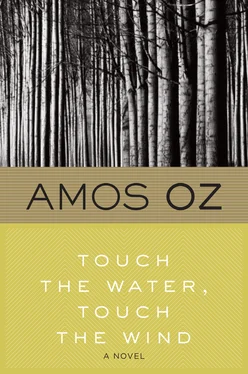A week after Ernst and his two middle-aged lady friends visited Pomeranz's room, the following Friday night, the Cultural Committee planned a modest celebration of the discovery and its discoverer.
But an hour or two before the appointed time, the guest of honor suffered the loss of his dog. The dog had stretched his legs, stared for some minutes through the window toward the fading hills, or perhaps at the curtains moving in the breeze, then he had suddenly given way and died as if suddenly stricken with absent-mindedness or unbearable boredom.
They assumed that Pomeranz would be sad, and out of delicacy of feeling they decided to postpone the party. A dusty moon glowed in the east. And because there were no clouds racing across the sky, the moon stood stubbornly, solidly still.
In the dining hall they showed instead a detective thriller, a black-and-white American mystery about a crime, false motive, true motive. Pomeranz sat alone on the bench in the little garden opposite his house. Far away in the darkness a cow lowed stupidly, lowed again and stopped. Strange dogs, wolf dogs, stood huge and dark at the edge of the wood with wet snouts, raising their slavering muzzles to the moon. Through the pine trees a mad moon bit them. All night long the huge dogs howled.
Day by day Pomeranz's fame spread through the country and abroad. People with problems or aspirations continually wrote to him, came, probed. He pursued his nightly studies, making calculations by the light of his desk lamp, putting out cautious feelers in unimaginable regions where mathematics and music were as close as two separate rivers issuing from the melting of the same snows.
But what can simple folk know of the private life of the virtuoso, the daily routine of a man no longer young left alone with his body.
Prolonged celibacy: relations of pent-up boredom, of faint disgust, with the inescapable body, with its whims, its demands, its impositions. For years he had found it repulsive. Its relentless, loathsome needs. There was no refuge from this blue-veined, capricious body, as if one were condemned to spending the rest of one's life shut up in a single room with some sweaty aging relation, with swollen veins and foul breath. And endless grumbles and tantrums and denials and complaints.
The tightlipped effort to concentrate in spite of everything, to escape, to elude the foe, to explore and investigate a limpid, almost airless sphere, while all the time beyond the thin partition an excited girl laughs screams pleads as if she were being rolled in honey or having her soles pricked with tiny needles. Audrey Audrey.
Your body odor on the towel. Clench your teeth and restrain yourself.
The ruthless tyranny of the cheap alarm clock: Get up. Go to bed. Sit down.
The dishes in the sink.
The irritating tendency of the black shoe polish to dry and crack because the lid of the tin has not been put back quite straight.
The milk going sour too soon.
A dull, sticky taste in the throat.
Black coffee.
Heartburn.
A hacking cough in the early morning.
The stink of your aging body which emanates even from the armchair, from the bedspread. The endlessly repeated sweeping. The invincible dust.
The daily carpet-beating.
And all the time the continual wheezing, like the wheezing of an old woman.
The humiliating need to remind yourself at such moments, you are the discoverer, you are the celebrity, you are the virtuoso, so pull yourself together and wash the dishes.
Talking to yourself — in Polish.
And the feeling of despair when you can't find a simple, everyday word.
The numerous petty irritations: a few grains of sugar fall on the floor, throngs of exultant ants appear, you snatch the insect spray and go out to do battle, at once a large paraffin stain starts spreading on your trousers.
Moments of carelessness: your sleeve knocks a cup off the table. It shatters on the floor. A pool of spilled coffee. And to drive the humiliating lesson home, the rug, too, is stained.
Or, say, the clean underwear finding its way by mistake into the dirty laundry, the teaspoon ending up somehow in your trouser pocket, comic mishaps, the laboriously replaced light bulb turning out to be a dead one itself, lemon squeezed into milk tea, all so shaming, and wasn't the whole point supposed to be the power to work wonders, to reveal something of the harmony of the spheres, to work some kind of salvation?
Over everything, like the glass eyes of a stuffed bear, this coarse bitter hunger, night and day, for a woman's gracious bounty.
Rise up and put off your flesh, and rest and peace will come. Could any truth be simpler than this.
When Stefa first visited Engineer Kumin in Novosibirsk he told her that his old father lived on top of a holy mountain in Palestine and wrote poems of yearning for Zion.
But Old Kumin merely lived in an old people's home in Givatayim.
In addition to the digestive disorder which had enabled him to leave Russia, the old man also suffered from outbursts of melancholy and a dripping ear. He was a tall, bent man of eighty-two, with rosy cheeks and cloudy blue eyes. Despite his various aches and pains, there was something strong and sharp about him, like a bird of prey.
Even though he had never worn glasses and even now his eyesight was adequate, his nose seemed somehow bare and overprominent, as if he had just lost his spectacles and the outside world had become totally blurred. He had a perpetual expression of dumfounded malice.
Indeed, many people supposed him to be a foolish old man. He was in the habit of appearing without warning at meetings of poets, at conferences of educationalists and public leaders, pouncing on the microphone with liberal use of his elbows and tongue, and furiously denouncing someone or something in a strong Russian accent and roars of rusty anger. He also penned frequent letters to the editors of the newspapers vehemently maintaining that this or that matter of public interest was bound to end badly.
His deafness and his constant fury protected him against every sign of disrespect or derision from the ignorant masses. If they replied to his assertions, he did not listen, If they argued with him, he did not hear. Once during the Silver Jubilee celebrations Kumin mounted the rostrum of the Trades Union Council, stood over Prime Minister Eshkol, and loudly proclaimed: You, Sir, are a troubler of Israel. Before he could be seized he had made with surprising speed for the door and walked out of the hall in disgust. He returned at once to his room in the old people's home and began composing a long and bitter epistle addressed to the writer Haim Hazaz.
Before the Russian Revolution Gershon Kumin had been a pharmacist, surgical assistant, and poet in Odessa. In the course of his life he had suffered many colorful vicissitudes, some of them noble, others base and degrading. Not only had he fallen in love as a young man with a non-Jewish girl student, but he was married against his will to a girl from the violently anti-Zionist Getzler family. When he sent some poems of yearning for Zion to the famous literary editor Ravnitsky, Ravnitsky wrote back that although they were priceless gems all the poems would need to be drastically shortened. And even though at the end of his letter Ravnitsky called him the "sweet singer of Zion," Kumin never forgot or forgave the abhorrent phrase "drastically shortened." Then the Revolution broke out. First his wife and then his only daughter fell in love with the bloody anarchist Fyodor Sosloparov and followed him to Samarkand, to the Chinese border, to Kamchatka, and there the three of them disappeared without trace. It was said that they had died, or committed suicide together, or that the steppe wolves had eaten them on their travels, or perhaps that they had managed to escape by boat to the Isles of Japan, or even to flee across the Bering Strait over the ice. There was a rumor at one time that the three revolutionaries had eventually reached Argentina, where they had made a fortune in canned beef.
Читать дальше

![Хироми Каваками - Strange Weather in Tokyo [= The Briefcase]](/books/29150/hiromi-kavakami-strange-weather-in-tokyo-the-br-thumb.webp)










